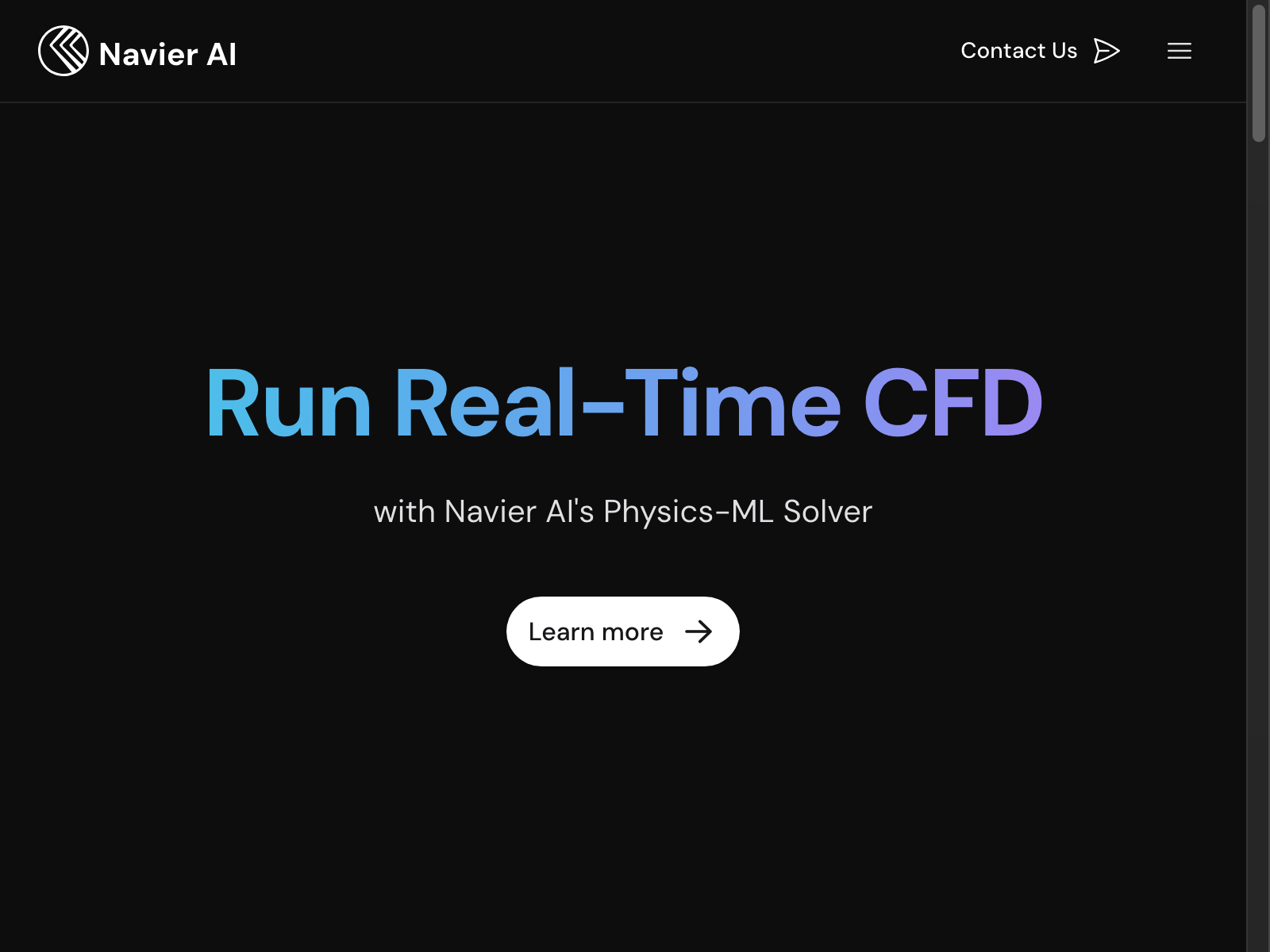Navier AI Review: Building 1000x Faster Simulations with Physics-ML Solver
Published on
Navier AI is an innovative AI tool that aims to revolutionize simulation processes by providing a physics-ML solver capable of building simulations 1000 times faster. By utilizing cutting-edge technology, Navier AI has trained its model on vast amounts of high-quality simulations, enabling it to fine-tune its performance and deliver accurate and efficient results. In this review, we will delve into the Navier AI tool, discussing its description, key features, use cases, pros and cons, pricing, and answer frequently asked questions.
Navier AI Description
Navier AI's core objective is to empower users with the ability to conduct simulations at an unprecedented speed, making complex physics-based calculations manageable within a fraction of the time required by traditional methods. By combining the power of artificial intelligence with physics-based models, Navier AI provides a unique solver that can optimize and accelerate simulations across various domains and applications.
Navier AI Review
Navier AI's impressive physics-ML solver has received positive feedback from users across different industries. With its ability to expedite simulation processes, this tool has become a game-changer for researchers, engineers, and scientists. Simulations that previously took days or even weeks to complete can now be done in a matter of hours, significantly increasing productivity and efficiency in the development of complex systems.
The accuracy of the simulations generated by Navier AI is also worth mentioning. The model's training on high-quality simulations ensures reliable results that can be trusted for making informed decisions. Moreover, Navier AI's solver is adaptable and adjustable, allowing users to fine-tune parameters to match their unique requirements.
Navier AI Use Cases
Navier AI finds utility in multiple domains and disciplines. Some key use cases for this innovative AI tool include:
-
Aerospace Engineering: Navier AI can aid in simulating aerodynamics, fluid dynamics, and structural analysis, enabling engineers to optimize designs and improve aircraft performance.
-
Automotive Industry: With Navier AI, engineers can simulate collision analyses, fluid flow, and vehicle dynamics, facilitating the development of safer and more efficient automobiles.
-
Manufacturing Processes: Simulations involving heat transfer, material behavior, and stress analysis can be performed swiftly with Navier AI, helping manufacturers enhance product quality and streamline production.
-
Renewable Energy: Researchers working on wind energy, solar power, or hydrodynamics can leverage Navier AI to simulate and optimize energy systems, accelerating the shift toward sustainable solutions.
Navier AI Key Features
Navier AI offers a range of powerful features that contribute to its exceptional performance and versatility. Some notable features include:
-
Physics-ML Solver: The core of Navier AI's tool is its physics-ML solver, capable of rapidly solving complex physics equations.
-
High-Quality Simulation Training: The model is trained on massive amounts of high-quality simulations, ensuring accurate and reliable results.
-
Fine-Tuning Capabilities: Users have the flexibility to fine-tune simulation parameters to align with their specific needs, improving customization and adaptability.
-
Seamless Integration: Navier AI can be easily integrated into existing workflows and software ecosystems, enhancing productivity and collaboration.
Pros and Cons
Pros:
- Drastically reduces simulation time
- Provides accurate and reliable results
- Customizable parameters for enhanced adaptability
- Seamless integration with existing workflows
Cons:
- Limited to simulation-based applications
- Pricing may be prohibitive for smaller teams or individuals
Pricing
For detailed pricing information, it is recommended to visit Navier AI's official website: Navier AI (opens in a new tab)
FAQs (Frequently Asked Questions)
-
Can Navier AI be used for real-time simulations? Navier AI focuses primarily on building simulations that optimize accuracy and efficiency, rather than supporting real-time simulations.
-
Does Navier AI require specialized hardware? Navier AI can run on standard hardware, making it accessible to a wide range of users without hefty infrastructure investments.
-
What level of expertise is required to utilize Navier AI? While basic knowledge of simulations and physics is beneficial, Navier AI is designed to be user-friendly and accessible to users with varying levels of expertise.
-
What support options are available with Navier AI? Navier AI offers comprehensive documentation, tutorials, and support channels to assist users in maximizing their experience with the tool.
In conclusion, Navier AI's physics-ML solver has proven to be a groundbreaking tool for accelerating simulation processes. With its ability to deliver accurate results in a fraction of the time, Navier AI empowers users across industries to streamline development and decision-making. While the tool may have its limitations and pricing considerations, its numerous benefits make it a valuable asset for those seeking efficient and reliable simulation solutions.
Disclaimer: This article is intended for informational purposes only. Please visit the official website of Navier AI for the most accurate and up-to-date information.

